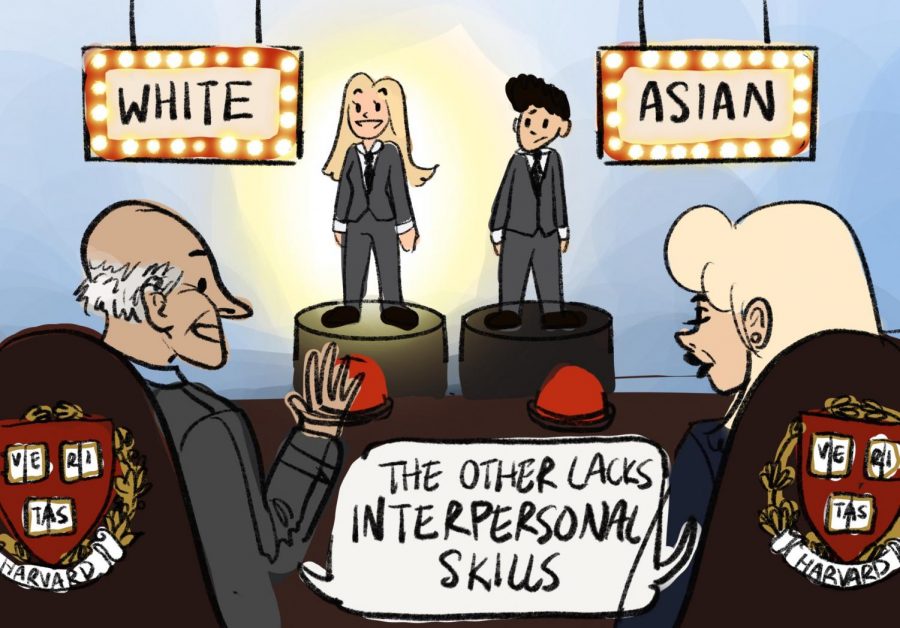Editorial: Race-conscious admissions maintain diversity in college
October 20, 2019
Two weeks ago, Judge Allison Burroughs ruled that Harvard University’s use of race in the college admissions process is legal and not discriminatory against Asian Americans as was alleged by the group Students for Fair Admissions (SFFA) in 2014. In short, the court upheld affirmative action, the legal policy that colleges may incorporate applicants’ racial background into admissions decisions in order to counteract the effects of racially-based educational opportunity differences.
Race-conscious thinking is often misidentified as a “racist system” that foils a meritocratic system’s success. However, this argument fails to account for the fact that the educational system of the country is not a fair meritocracy; because of enduring systemic racial biases, people simply do not have equal opportunities. In reality, race-conscious thinking, such as currently instituted in some universities, includes race as one of many factors and allows the formation of a diverse student body, which creates a better social and academic learning environment for all students.
Everyone is undeniably affected by their race whether through implicit biases in their interactions with others or systemic biases and discrimination, so a college admissions process that lacks the ability to include race in its view of applicants is not holistic, fair or effective in creating a racially diverse student body. This case has set minorities against each other seeking an end to a race-influenced educational system, an end that would hurt minorities as a whole and only serve to alienate them from higher education.
This piece was originally published in the pages of The Winged Post on October 17, 2019.


















![“[Building nerf blasters] became this outlet of creativity for me that hasn't been matched by anything else. The process [of] making a build complete to your desire is such a painstakingly difficult process, but I've had to learn from [the skills needed from] soldering to proper painting. There's so many different options for everything, if you think about it, it exists. The best part is [that] if it doesn't exist, you can build it yourself," Ishaan Parate said.](https://harkeraquila.com/wp-content/uploads/2022/08/DSC_8149-900x604.jpg)




![“When I came into high school, I was ready to be a follower. But DECA was a game changer for me. It helped me overcome my fear of public speaking, and it's played such a major role in who I've become today. To be able to successfully lead a chapter of 150 students, an officer team and be one of the upperclassmen I once really admired is something I'm [really] proud of,” Anvitha Tummala ('21) said.](https://harkeraquila.com/wp-content/uploads/2021/07/Screen-Shot-2021-07-25-at-9.50.05-AM-900x594.png)







![“I think getting up in the morning and having a sense of purpose [is exciting]. I think without a certain amount of drive, life is kind of obsolete and mundane, and I think having that every single day is what makes each day unique and kind of makes life exciting,” Neymika Jain (12) said.](https://harkeraquila.com/wp-content/uploads/2017/06/Screen-Shot-2017-06-03-at-4.54.16-PM.png)








![“My slogan is ‘slow feet, don’t eat, and I’m hungry.’ You need to run fast to get where you are–you aren't going to get those championships if you aren't fast,” Angel Cervantes (12) said. “I want to do well in school on my tests and in track and win championships for my team. I live by that, [and] I can do that anywhere: in the classroom or on the field.”](https://harkeraquila.com/wp-content/uploads/2018/06/DSC5146-900x601.jpg)
![“[Volleyball has] taught me how to fall correctly, and another thing it taught is that you don’t have to be the best at something to be good at it. If you just hit the ball in a smart way, then it still scores points and you’re good at it. You could be a background player and still make a much bigger impact on the team than you would think,” Anya Gert (’20) said.](https://harkeraquila.com/wp-content/uploads/2020/06/AnnaGert_JinTuan_HoHPhotoEdited-600x900.jpeg)

![“I'm not nearly there yet, but [my confidence has] definitely been getting better since I was pretty shy and timid coming into Harker my freshman year. I know that there's a lot of people that are really confident in what they do, and I really admire them. Everyone's so driven and that has really pushed me to kind of try to find my own place in high school and be more confident,” Alyssa Huang (’20) said.](https://harkeraquila.com/wp-content/uploads/2020/06/AlyssaHuang_EmilyChen_HoHPhoto-900x749.jpeg)










